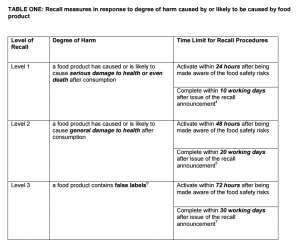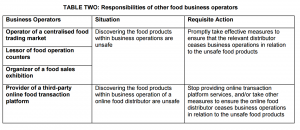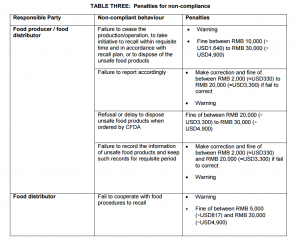5 June, 2015
On March 11, 2015, the China Food and Drug Administration (the "CFDA") issued the Measures for the Administration of Recall of Food Products (the "Food Recall Measures"), which will become effective on September 1, 2015. This is a significant move by the PRC government in the development of China's system for food recalls and more broadly for food safety administration.
Legislative History On The Recall Of Food Products
With multiple food scandals in China receiving national and international attention, food safety has been a pressing concern in China. In recent years, the PRC regulatory authorities have sought to promulgate new laws and regulations in this area. A key measure employed in its fight against food safety concerns is the development of a more comprehensive system to recall unsafe food products.
The first significant food recall regulation was issued in 2007 when the Administration of Quality Supervision, Inspection and Quarantine (the "AQSIQ")1 , the Measures for the Administration of Recall of Food Products (the "Food Recall Measures of 2007"). Subsequently, food safety rules were elevated to the status of "law" with the PRC Standing Committee of the National People's Congress's promulgation of the PRC Food Safety Law (the "Food Safety Law") in 2009, where the Food Safety Law provided a legal basis for the establishment of a food recall system. The administrative bodies then involved in food safety, the AQSIQ and the CFDA, followed up by publishing draft measures in the recall of food products and health food products in their respective scope of administrative responsibilities.2
A major change was made in 2014 when the PRC government consolidated administrative powers in the CFDA by transferring recall responsibility and authority in "food products" from the AQSIQ to the CFDA, thus providing the CFDA with administrative power over the recall of food products and health food products.
Subsequently, the CFDA unveiled the Measures for the Supervision and Administration of the Recall and Business Cessation of Food Products (Draft for Comments) on 6 August 2014, culminating in the promulgation of the Food Recall Measures seven months later.
Food Recall System Under New Rules
The Food Recall Measures apply to food products, food additives and health foods.3
The Food Recall Measures put in place a recall system that includes the (i) cessation of production and business operations, (ii) recall and reporting procedures, and (iii) disposal of unsafe food products.
Which Food Products Must Be Recalled?
The Food Recall Measures provide that “unsafe food products” are to be recalled and disposed. "Unsafe food products" is broadly defined to include food products “where the production and business operations are prohibited by food safety laws and regulations” and “where there is evidence that they may be harmful to human health”. The degree of harm caused or to be caused is the key factor for defining an unsafe food product and provides the basis on the level of responsiveness in the recall of food products (see Table 1 below for further details).
Further, the Food Recall Measures contemplates relying on food safety experts in determining whether food products are unsafe. Such experts will come from chosen fields of medicine, toxicology, chemistry, food, law, and other areas. Their information will be stored in a food safety expert database established by the relevant branch of the CFDA at or above the county level. They will provide professional support in making various determinations, such as deciding on the ceasing of production and distribution and on the recall and disposal of unsafe food products.
How To Recall Unsafe Food Products?
Note, however, that the Food Recall Measures provide that food producers and distributors shall be primarily responsible for food safety. In other words, they are essentially the first in line to decide on the ceasing of production and distribution and the recall and disposal of unsafe food products.
In addition, other market players, such as the organizer of a food trade fair and the provider of a third-party online food transaction platform, are required to put together measures to stop the distribution of unsafe food products.
The relevant branch of the CFDA will also be involved if the food producers or other relevant market players do not take the requisite actions to recall unsafe food products. We summarize below the requisite actions to be taken by food producers, distributors and other market players.
Food Producer
(1) Cease Production
Once a food producer discovers that a food product that it produces or is included in its distribution is unsafe, the food producer shall:
(i) immediately cease the production of the food product;
(ii) inform relevant food producers and distributors to cease the production and distribution of such food product;
(iii) publicly inform consumers to stop consuming the food product; and
(iv) take other necessary measures to prevent and control food safety-related risks.
The relevant branch of the CFDA may order a food producer to stop the production of the unsafe food products if the food producer fails to stop the production as required.
(2) Recall And Reporting
When a food producer discovers (whether through selfassessment and self-testing, complaints and tip-offs from the public, information provided by food distributors and authorities, or other means) that a food product it produces or is included in its business operation is unsafe, the food producer shall recall the food product. It must also report its recall plan to the relevant branch of the CFDA.
The relevant branch of the CFDA may order the food producer to recall the unsafe food product if the food producer should have done so but did not.
As discussed above, the recall measures are divided into three levels based on the degree of harm caused or to be caused by the unsafe food products. These measures are set out in Table 1 below.
(Click to enlarge)
Upon receipt of a food producer's recall plan, the CFDA may organise food safety experts to review such plan. The food producer must recall unsafe food products in accordance with its recall plan as evaluated (and revised, if necessary) by CFDA. A recall plan must include the following information.
a) The name, domicile, legal representative, specific person-in-charge, contact details and other basic information of the food producer;
b) The name, trademark, specifications, production date, production batches and quantity of the food product to be recalled, as well as the geographical scope of the recall;
c) The reasons for the recall and harmful consequences;
d) The level, procedures and time limits of the recall;
e) The contents of the recall notice or announcement, and the means of the release of such notice or announcement;
f) The obligations and responsibilities of relevant food producers and distributors;
g) The measures to dispose of the recalled food product, and the assumption of relevant expenses incurred; and
h) The expected effects of the recall. If the unsafe food product is sold within a province, autonomous region or municipality, the food recall announcement shall be published on the website of the provincial branch of the CFDA and via major provinciallevel media outlets.
If the unsafe food product is sold in two or more provinces, autonomous regions or municipalities, the food recall announcement shall be published on the website of the state-level CFDA and via major central-level media outlets. A recall announcement shall contain the following information:
a) The name, domicile, legal representative, specific person-in-charge, contact phone number, e-mail address, and like information of the food producer;
b) The name, trademark, specifications, production date, production batches, and like information of the food product to be recalled;
c) The reasons for the recall, the level and geographical scope of the recall, and the dates on which the recall shall commence and end; and d) The obligations of relevant food producers and distributors, and the procedures for consumers to return the food product and claim compensation.
(3) Disposal
The food producer shall:
- further handle the unsafe food products in a way that is not harmful (e.g. landfill disposal, incineration, compost), destroy and take other similar measures to dispose of unsafe food products that are withdrawn from the market;
- immediately destroy unsafe food products on the spot if such products (i) contain illegally added non-edible substances, (ii) have become rotten and deteriorated, (iii) contain sick and dead livestock, or (iv) otherwise seriously endanger human health and is life-threatening; and
- organize food safety experts to conduct assessments if it is unsure of the ways to dispose of unsafe food products.
The relevant branch of the CFDA may order the food producer to dispose of the unsafe food product if the food producer fails to dispose as required.
(4) Other Obligations – Recording, Treatment, Recycling
The food producer shall record the name, trademark, specifications, production date, production batches, quantity and other information of unsafe food products (i) of which the production or business operations has ceased, or (ii) which have been recalled and disposed. Such records, which are normally recorded in the food producer's quality management system, must be retained for at least two years.
Where food products are recalled due to defective labelling, the food producer may continue to sell the products after remedial measures have been taken, the food producer can ensure food safety, and the food producer expressly informs the consumer at the time of sale of the remedial measures taken.
If unsafe food products can be handled in a way that is not harmful and be recycled, the food producer may conduct such handling according to applicable laws.
Food Distributor
(1) Cease Business Operations
Once a food distributor finds that a food product within its business operations is unsafe, the food distributor shall (i) immediately cease distribution of the food product, (ii) inform the relevant food producers and distributors to cease production and distribution of the food product, (iii) publicly inform consumers to stop consuming the food product, and (iv) take othernecessary measures to prevent and control the food safety risks.
When the unsafe food is being processed by other business operators but have not yet been sold to consumers, the food distributor shall immediately recover the unsafe food products, and take necessary measures to “eliminate the risks.”
The relevant branch of the CFDA may order the food distributor to stop the distribution of the unsafe food product, if the distributor fails to stop the distribution as required.
(2) Recall:
Once a food distributor discovers that the relevant food producer has recalled an unsafe food product, the food distributor shall cooperate with the food producer by immediately taking measures to (i) stop the purchase and sale of the unsafe food product, (ii) seal up the unsafe food product, (iii) post the recall announcement issued by the food producer in an obvious and clear location on its business premises. The food distributor shall take the responsibility to recall unsafe food products within its scope of business where the food producer is unable to conduct the recall because the food producer's identity is unknown, the food producer becomes bankrupt, etc.
Where the food distributor has caused the food products to be unsafe, the distributor shall take the initiative to recall such food products. It shall also inform the product suppliers immediately, and the product suppliers shall promptly inform the food producers accordingly. In the recall notice or announcement for such recall, the distributor shall indicate specifically that such recall is due to reasons attributable to itself.
(3) Disposal:
A food distributor essentially holds the same responsibilities 8 as a food producer in the disposal of unsafe food products.
Other Market Players
The Food Recall Measures also impose obligations on other business operators in food products. We set out below the relevant actions required for other food business operators in Table Two below.
(Click to enlarge)
Failure To Comply
Penalties will be imposed on relevant responsible parties for its failure to comply with the Food Recall Measures. A summary of penalties is demonstrated in Table Three below.
(Click to enlarge)
Summary
Implementing a set of detailed and up-to-date rules on the recall system for food products is an inevitable response to increasing international scrutiny over China's food safety. The Food Recall Measures reflect the PRC authorities' determination to improve the administration of food products in the Chinese market and ultimately China's image in this respect.
The re-tooling of China's food safety system can be seen not only in the Food Recall Measures, but also in the higher-level Food Safety Law currently being revised and expected to be re-issued within this year. Its provisions relating to the food recall system are consistent with the Food Recall Measures. These topto-bottom changes in China's legislative and regulatory framework demonstrate China's tenacity to overcome its food safety issues and likely signal a new chapter in China’s never-ending battle against unscrupulous food suppliers, many of which have proliferated under an unchecked environment and which are now starting to feel the noose tightening.
End Notes:
1 The authority in charge of food manufacturing and distribution at that time.
2 Before 2014, the AQSIQ was in charge of the recall of food products, while the CFDA was in charge of the recall of health food products.
3 Reference to the Food Recall Measures can be made in relation to edible agricultural products after such products entered into the Chinese market.
4 Where there are complications, the food producer may extend the period of recall and inform the public of such extension, based upon consent of the local branch of the CFDA.
5 Ibid.
6 If there are defects in the labels and identifying information and the food product will not cause damage to health after being consumed, the food producer shall correct the defects, and can choose to launch a voluntary recall.
7 Same as Footnote 5.
8 There is one exception. Where food products are recalled as its labels or identifying information are not in compliance with food safety standards, it is the food producer (not the food distributor) that should take remedial measures and the food producer can continue to sell such food products (as described above).
For further information, please contact:
Jun Wei, Partner, Hogan Lovells
jun.wei@hoganlovells.com
Roy Zou, Partner, Hogan Lovells
roy.zou@hoganlovells.com
Philip Cheng, Partner, Hogan Lovells
philip.cheng@hoganlovells.com
Michael Zou, Hogan Lovells
michael.zou@hoganlovells.com
Jessie Xie, Hogan Lovells
jessie.xie@hoganlovells.com








